Saheli Datta started this when she was a journalism student at Columbia in New York. Now she lives in the Bay Area. *Old people call me R. New people, call me Saheli. Thanks! My homepage. Specifically, my links. Email me: Saheli [AT] Gmail [dot] Com
Monday, October 31, 2005
A couple weeks ago my friend Tom Meagher completed an impressive package on poverty for the Herald Morning News at New Jersey. I missed blogging about it immediately, but hopefully I can bring up the rear and keep interest going in what is an evergreen but oft ignored story. Tom lived and worked undercover as a low wage laborer for a month, profling two immigrant laborers. Besides the package he has another article on the topic today. I also blogged about the immigrant angle of the package over at Sepia Mutiny. Check out Tom's work--it's good stuff, as always.
I'm not really enough of a Bob Woodward scholar to evaluate these rumblings, but I have to say that the recent uh-huh throat clearing about Woodward and his ties to the system he reports resonate with concerns that have bugged me for years. Yeah, yeah, we've all seen All The President's Men, and this was the guy who helped take down the president. But whenever I hear or read about his miles of anonymous sources--miles and miles of them--it feels a little strange. That said, I wish this compare and contrast post by Larry Johnson at TMPCafe was a little less snide and ad hominem and a little more spelled out. Johnson is basically saying that the reason Woodward is going around (by appearing on shows like Larry King Live, for example), and dismissing the damage of outing Valerie Plame is because Scooter Libby was probably one of his sources. It does make me want to go back and read Woodward's recent books to see if there's more quotes along the lines of the ones Johnson cites. It would be sad if it were true. But I always like Dustin Hoffman better anyway.
Friday, October 28, 2005
After getting Rushdie's answer about great writers needing to be born with "an ear" for dialogue, I was thinking about the affection I have for eavesdropping. It's only a middling good habit for a journalist--at some point you have to identify yourself if you want to attribute the quote, and so most of what you learn will only be useful as background--but it's a great habit for a novelist. Oftentimes on BART trains, I like to just sit there and pretend to be asleep and absorb the conversational noise around me.
For example last week there were three people in their twenties, lounging relaxedly across two pairs of seats facing each other. A guy and a girl, clearly together, sat facing another guy with exquisite cornrows, olive skin, and an arched aquiline nose. He sat like a man in charge, and talked like a man in charge, and you could tell he was used to being the cool guy in charge. He was talking to the girl when I sat down across the aisle from them.
"Abdullah? Your brother's Abdullah? That's hilarious. I know him! I've worked with him. He's one cool cat."
And from the ensuing conversation I gathered that this brother did not approve of the boyfriend, and was making life difficult for his sister, and the boyfriend was asking the other guy, his friend with the cornrows, "do you think I can take him, yo?" and the guy with the cornrows said, "no way, I wouldn't let it happen," and was carefully pondering how to broker peace. The murmurs of conversation that drifted across the aisle to me painted images of young men bonding at construction sites and pool tables, doors slamming, and secret bad habits.
Another one: today I was going up an elevator in an office building in downtown San Francisco. Two guys in suits got on the elevator with me. They had clearly been talking to each other previous to getting on the elvator, but they smiled at me when they got on and then were silent. Perhaps their conversation was too confidential for a stranger's ear? Then, as we made our way up the stories, one opened his mouth. "You know," he began, and I braced myself for boring conversation, "you know. . . Jennifer was actually fired." "She was, huh?" "Yes. People don't know that, but she was fired. James told me." "Why?" "She was a disaster. She was just very--" and they stepped out onto their floor. I wanted to chase after them and get the rest of the story. And yet, they were completely discreet, because I have no idea who they were talking about, and neither, dear reader, do you.*
There has been much discussion online and in print lately about "Overheard in New York," which is indeed a stupefying and fun website, if frequently as obscene and cruel as life, and (I think) a bit racially suspect**:
Guy on cell: Yeah I know her, my sister went out with her when she was still a man. (Link)It is, however, a mere follower to the precedent established by the kinder and more subtle "Eve", a Berkeley alum who runs Inpassing.org, which is sadly infrequent now that she's a career woman:
Hasidic boy: Poppola, I heard a rumor that when a cow gets a cut from the milking machine, and blood gets in the milk...they have to turn it into chocolate milk, so people won't know it's there.
Hasidic grandpa: We should be so lucky! (Link)
Girl: These fish are big, yo! Or is this tank magnetic? (Link)
"Even the Aztecs would agree that 64 ounces of hot chocolate is just plain wrong." (Link.)I am a sucker for these sites. I've also started collecting quotable sentences from my family and friends, which I often think I will put on t-shirts and sell on this blog to achieve world domination. So I was amused to come across a site, bash.org, that allows people to upload quotes from their instant messaging sessions and chatrooms. Now, most of the quoted conversations are really, unredeemably obscene, so I don't recommend you go surfing around there just any old time. Indeed it's quite depressing how juvenile, vulgar, and frequently racist, sexist and homophobic most of the conversations are. But somehow that makes the acceptable bits even more interesting. Here are a few odd ones, filtered out of the muck for you:
"It's so genuine, and natural. There's just a certain... purity about it."
"Hey, it's just a smoothie."
--Two guys outside of Juice Appeal (Link.)
[jeebus] the "bishop" came to our church today
[jeebus] he was a f---- impostor
[jeebus] never once moved diagonally
[Patrician|Away] what does your robot do, sam
[bovril] it collects data about the surrounding environment, then discards it and drives into walls
[nick] grah windows just crashed again, unstable crap.
[yukito] Windows isn't unstable, it's just spontaneous.
[studmuffn] one day i will find a way to implant annoying songs in other peoples heads
[studmuffn] it will be my supervillian power
[rzrshrp] I want food
[NickBlasta] build more farms
[@Logan] I spent a minute looking at my own code by accident.
[@Logan] I was thinking "What the hell is this guy doing?"
So much of our mundane conversation and spontaneous wackiness is now recorded and distributed. It's like flying past a million people's bedroom windows and dropping in on their couches for milliseconds at a time. How much character can you imagine from a single couplet? The ancient coders, the smart-alecs, the childish, the stoic, the ranters and the ravers, secretive gossipers and clans undone. I wonder how all this will change our writers' sense of hearing.
*This reminded me of the opening issue of Journal of Mundane Behavior, on Japanese Elevator protocol.
**I think this b/c speakers are almost never identified as white unless it figures in the story, while they are frequently identified as black, Hispanic, or Asian even when it seems utterly irrelevant. Since most of the overheard snippets paint the speakers in a bad light, this is particularly unfortunate.
Wednesday, October 26, 2005

Blog Quake Day
Notified by Anna at Sepia Mutiny, I'm notifying all of you. Today is Blog Quake Day. If you can, give some cash to a group working to relieve the awful suffering caused by the Kashmiri Earthquake. The Quake Help Blog is here, and the Wiki list of aid organizations is here. Oxfam is getting my donation; I know that tomorrow or the day after or some day after that, there will be another major disaster, and that every day there is a worldwide disaster of hunger, and that Oxfam recruits good people, so I am making this donation a general donation. But however you want to give, please give. Thank you!
Do swans migrate from China to Croatia? At the rate they're destroying domestic poultry every time they find influenza-infected dead wild fowl, there won't be many agircultural birds left in Eurasia. I suppose all that feed corn and soy could probably be more efficiently used to feed people directly--but I hope they don't start slaughtering the wild birds. There's something spooky about imagining a swan carrying an illness from the Middle Kingdom to the Illyrian coast--like a Han folktale Brothers Grimm mashup. It would be heartbreakingly tragic if our disease cycles finished off the world's wild flocks.
Tuesday, October 25, 2005
History is important. Because we don't want to repeat it, because we rely on it for evidence for our economic and policy goals, because not dealing with it screws up our collective memory and psychological health, because it's who we are. . .blah blah blah. I believe all these things and have always been passionate about history--it was far and away my best subject in school. But there is one place where it matters most precisely and most mechanically, and that is the law. Law is very often based on precedent, and the fair implementation of precedent requires good archives, good records, and a good understanding of the past. Especially when we're talking about laws that aren't applied in tidy courtrooms but on battlegrounds.
Intel-Dump has been considering the scandal over the burning of Taliban corpses. Time article here. To sum up, two Taliban soldiers, probably Pakistani in origin, were killed on a rocky outcrop by Americans who were fighting with more Taliban in the village below. The bodies decayed in the heat. The Americans were unwilling to give up the outcrop, and asked the villagers to come and retrieve the bodies for burial. When the villagers refused, the soldiers burned the bodies. Cremation, of course, is extremely un-Islamic.
First John Holdaway pointed out that "The most interesting fact is that CENTCOM and the Pentagon have become the biggest cheerleaders against the soldiers, stoking the issue with language in press releases usually reserved for the actions of Iraqi insurgents and terrorists." He then played defense counsel, asserting that the CENTCOM press releases constitute "Unlawful Command Influence," and building a case for why, under the Geneva Conventions, the cremations were not problematic.
Then David Glazier pointed out that the President had already declared the letter of the Geneva Conventions inapplicable to the conflict in Afghanistan, so that was a defense which Holdaway missed out on. "But surely no competent attorney would allow his client to be convicted for violating the “spirit” of the law! ," he wrote. (And here is an example of recent history that is hard to keep track of, and therefore hard to have a good debate about. Did the White House really suspend the GC for all the combatants in all the battles in Afghanistan? I know the argument was that Al Qaeda fighters were not allied with any nation, but the Talibani fighters--at least in the beginning, until we installed Karzai--were, in fact, fighting on behalf of the Taliban government of Afghanistan, one which we recognized enough to deliver ultimatums too.) Glazier's real point, however, is that prosecutors don't need the Geneva Conventions in this case:
The real legal basis for prosecution here should not be the Geneva Conventions at all. Although it’s commonplace today to view the law of war as largely synonymous with the Geneva Conventions, and war crimes as beginning with Nuremburg, there is in fact a much larger body of customary law that remains fully applicable regardless of whether specific treaty provisions apply or not. As the government itself noted in defending the 1942 Nazi saboteur military commission before the Supreme Court:It seems to me that a real understanding of this lex non scripta (law not written) depends greatly on maintaining a good and reliable history of war, and constantly reminding people of that history. Tradition forgotten is tradition ignored. Without an understanding of the history of warfare, millions of American citizens, myself included, could easily be fooled into thinking that the debate about how we conduct ourselves in war is merely measured against what can and cannot be found in the Geneva Conventions, and if they do or do not apply. In fact, it seems, this lex non scripta has always applied. Ignorance is no excuse for breaking the law.
the law of war, like civil law, has a great lex non scripta, its own common law. This ‘common law of war’…is a centuries-old body of largely unwritten rules and principles of international law which governs the behavior of both soldiers and civilians during time of war…The law of war has always been applied in this country.The United States has tried a number of individuals for such offenses as failure to provide an honorable burial to enemy dead under this common law. . . The many American veterans who expressed dismay over these events recognize, even if not stating such in legal terms, that the U.S. military has long prided itself in compliance with the customary law of war. . . .So whether the conduct in question violates a Geneva Convention provision, or even whether the Geneva Conventions can lawfully be used as the basis of prosecuting our soldiers in Afghanistan misses the point. Violations of the customary law of war are chargeable under Article 134 of the UCMJ and the conduct at issue here is clearly triable by a general court-martial. (emphases mine.)
Postscript: Maybe it's because culturally, I find cremation to be the most respectful way to deal with decaying bodies, but I think it's kind of sad that it's in dealing with the dead that the Pentagon has decided to kick off a fuss. I'd much rather they improve our dealings with the living.
Friday, October 21, 2005
I'm not even going to try and keep track of the Judith Miller/Valerie Plame investigation story in real time. You've got people like Jay Rosen to do that. But I thought I'd point out that Jack Shafer at Slate's Pressbox has a good summary of what the real journalistic (as opposed to criminal-justice) story regarding Miller was and always will be---her incredible reporting about Weapons of Mass Destruction previous to the invasion of Iraq. Shafer has been a critic of this reporting for a long time--I remember snide comments being made about their feud when he spoke at Columbia a year and a half ago--but he states that, for the record, he was for the invasion. For the record, I was not. But I know plenty of people who were more ambivalently against it, or at least partially for it, in great measure because of Miller's original reporting. George Bush's base probably doesn't read the New York Times as gospel, but given the Times's reputation even then (and remember, most of this was before Jayson Blair), and given that Bush did not win the popular vote in 2000, I wouldn't be surprised if historians will find that her reporting had a tangible effect on the administration's ability to muster so much support and approval. Given the heavy price we are paying in money, lives, blowback, and depleted security resources, that is quite the object lesson in the importance of journalism. I, too, would like to know more about her sources, and more about her methods.
Thursday, October 20, 2005
Taran Rampersad urges someone to set up an SMS (cell-phone Short Messaging System) server to collect emergency text-messages from people otherwise incommunicado--and set it up ahead of time.
What do you need? An Asterisk Server, running Linux, a mobile phone number (or a number that can receive SMS), and some scripts to get the information to email lists, a website and RSS. There are many ways to do this, and if a few different groups explored different possibilities, the progress could really be worthwhile. (Link.)Rampersad has been trying to get people to experiment with such symptoms since before the Tsunami, when I first came across his work. Check it out and spread the word, especially if you know any Linux geeks.
Part of the project of overturning nationalism should involve moving away from 'national histories' told from the point of view of a single nation-state protagonist. Going from "this had nothing to do with us," to "this was a tremendous tragedy for us" takes an important step: it broadens the meaning of us.-- Saurabh at Rhinocrisy, at the end of a meditation on the histories of the Japanese-Chinese conflicts of World War II.
Tuesday, October 18, 2005
Tonight while I was walking to the Downtown Berkeley BART station I almost walked right into a large descending spider. She was around two centimeters across the body, with a very swollen abdomen, and she was dropping straight down from a tree over on east side of Shattuck, right in front of Games of Berkeley. I tried to take some pictures of her, and attracted a lot of attention, since from even a few feet away it probably looked like I was taking flash photography of an empty sidewalk. She was moving up and down really fast and my little Casio simply couldn't keep its focus on her fast enough--the main drawback of such a small camera. One Craig Leres happened to be near his camera, and got it, and he was able to at least focus on her. Unfortunately the flash washed all the markings out. I've tried to play with the contrast on photoshop.
I was particularly determined to record her because a couple nights ago I had come home to find a very similar spider camped out in front of my house, and was planning on blogging those pictures today anyway. As a friend of Craig's, Jef, says, they're probably just garden orb weavers, which I guess are fairly common. Somehow I suddenly find them rather thrilling. I never really noticed them before, and they seem large and substantial compared to the spindly or miniscule creatures I usually notice, their mottled coloring full of character and portent. I've had a mild interest in spiders since first grade, when my class room had a pet tarantula briefly, and I did a report on spiders and their webs. At my high school you could sometimes see tarantulas wandering about. In my family I'm usually the savior of spiders--if a spider confronts my mother or sister in the bathroom, its best hope of survival is if I'm home to carry it outside. Don't get me wrong, with my fabulous reactions to venom of any kind, I'm wary of the critters. But I try to give them their dues. Here's the spider from my house:
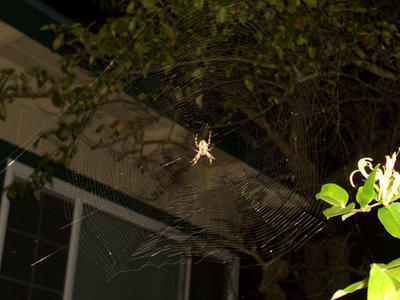
Click here for the rest of the post: more pictures and information . . .
Another "ventral" shot:

A "dorsal" shot:

Close-up crop:

Close-up crop on the "ventral" side:

Here's Craig Leres's original picture of the Shattuck spider--a small version so you can see the treetop context:
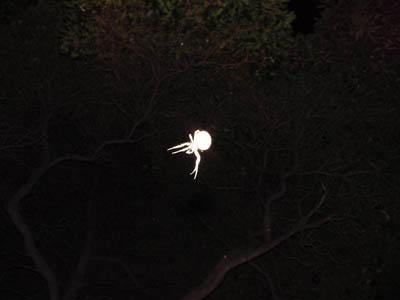
and here's my collection of Photoshop filter attempts:
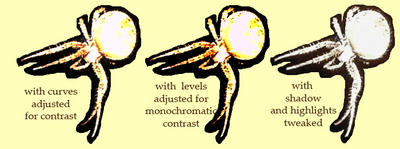
Craig's friend Jef has a recent picture of a garden orb weaver from his garden.
They're pretty amazing creatures. Check out this website about how the ornate web is constructed--usually every evening, to be ingested again before the dawn, with only the "bridge thread" left behind. (This checks with what I've observed in my garden.) This is an impressive collection of people's shots of garden orb weavers. Here's a page about Spiders! In Space! (I wonder if all the pages I'm finding are Australian because the spider is Australian in origin--brought over with the Eucalyptus?, because I just think these spiders are Garden Orb and they're actually not, or because Australians are just particularly arachnophilic.) Here's a Nature Biotechnology citation about in vitro expression and spinning of spider silk protein. I am particularly fascinated by the notion that spider web construction behaviors--the patterns and processes by which webs are made, usually distinctive to each species--are genetically inherited, not taught. I think this is the case from the cursory web surfing, though I'd like to find a more authoritative source. Makes me wish Peter Parker's next adventure involved the Spider Genome Project.
Sunday, October 16, 2005
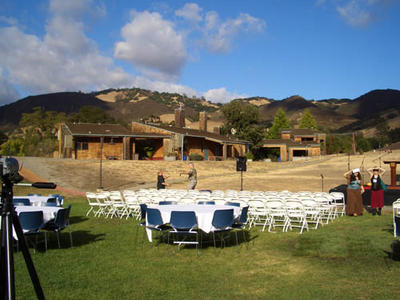 Happy Birthday Athenian!
Happy Birthday Athenian!Yesterday my school celebrated its 40th birthday. It was a beautiful day at one of my favorite spots on earth--the clouds wrestled with the sun, flocks of birds and lone birds of prey circled and swooped overhead, and the hills and the oak trees glowed gold and green about us. We applauded Dyke Brown, who abandoned his successful career at the Ford Foundation to found our school. He was inspired by a vision that had been planted in his heart when he was an exchange student under the inspired eye of Kurt Hahn, creator of Outward Bound and founder of the Salem School in Germany and the Gordonstoun School in Scotland. Athenian is one of the original Round Square schools, and it is built on Round Square educational principles: internationalism, education for democracy, stewardship of the earth, community service, and outdoor adventure. To that foundation Dyke added a vision of education where students and teachers were entwined like family, working together for both accomplishment and learning. We called our teachers by their first names, watched their children, and played with their pets. While I've probably spent far more time at UC Berkeley over the years, Athenian is probably still the single most influential institution in my life--the gusto and tenacity with which I dove into Cal fed directly upon an education in constantly imagining, and in endeavoring to make the visions real. Here's Dyke telling us about the trustees who so trusted in his vision that they pledged to keep the struggling young school afloat:
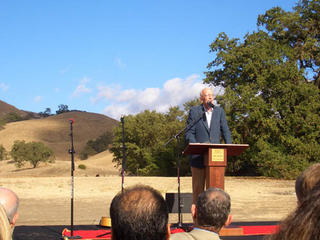
Click Here to Continue Reading . . .
I started a garden, a young authors association, and a newspaper at Athenian. I had the principles of the First Amendment drilled into me by the newspaper adviser, Carl Fredricksen, who would stuff my mailbox with articles extolling student publishers for pushing boundaries. Most faculty advisors reign their charges in, Carl always encouraged us to explore our freedom. I wanted a film class, and so I roped in some friends and we had one. I wanted to study Latin, so Spanish teacher Don Lindenau set aside time to tutor me in Latin. I wasn't satisfied with the way Indian culture was presented in the freshman world cultures class, so I was invited to TA that section of the class every year after. I wanted fish in the biology room, so my biology/physics teacher Bruce put me in charge of the biology room, and I learned to keep an aquarium. We didn't exactly run the school, but there were many things that were left to us, and we debated over them cantankerously. Somehow Eleanor Dase, the epitome of kind and gracious leadership, put up with us:
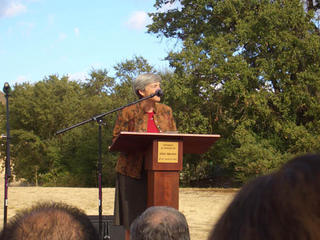
She's been heading the school for 13 years now, and keeping it true to its founding principles. She was also the best math teacher I had. Exchange students and international boarding students gave me friends from Germany, Thailand, Scotland, Australia, India, Japan, Korea, Malaysia, Taiwan, Singapore. There was the yearly allowance of community service, the Community Action Board, the trips to put a garden in a domestic abuse shelter, serve soup to the homeless, or maintain the trails at glorious Point Reyes. And there were so very many performances. Dancing, jazz, rock n' roll, chorale medleys, chamber music, and lots and lots of theater. We loved Shakespeare--"Bestir the Athenian Youth Unto Merriment"-- and despite the general lack of decorum, we absorbed the etiquette of being a respectul, attentive audience. No wonder--some of my schoolmates sang with astonishing beauty, including these three:
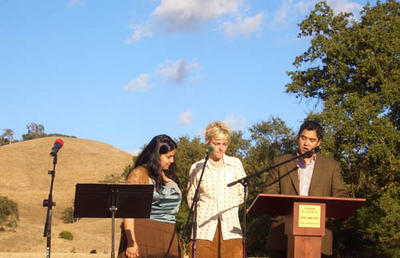
They are Margaret Valeriano '95, Juliana Prater '97, and Adrian Valeriano '92, and wow, their voices have only gotten better and better with age, having started out golden when we were students.
My physics and biology teacher Bruce Hamren gave me a picture he recently found of me. Ten years ago, fulfiling the Athenian Wilderness Experience (AWE) graduation requirement, I spent a month and a 100 miles backpacking in the High Sierras. We didn't have tents, only tarps, and we carried everything as a group. We went through this country, though it was considerably more snow-covered our year, climbing the California Matterhorn and hiking around the Sierra's Iceberg Lake. I recently reminisced to some friends how I ended up defending my food against a bear during the solo part of the course. The school year at Athenian was effectively started with a little ritual involving the AWE homecoming. When they brought us home they didn't even bring us all the way home--instead they dropped us off ten miles away and we had to "run-in." Well, running a flat ten miles empty-handed is not so tough when you've spent days climbing mountains carrying a pack that weighs half as much as you do. Besides--the path was lined with stations of fresh cold water, and signs cheerfully announced it to be iodine free. So here I am at the end of all that:
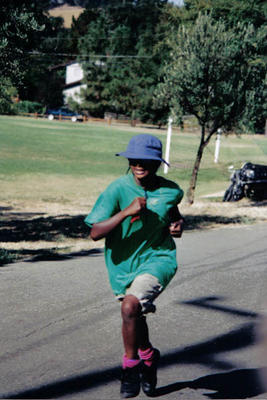
What you can't see are the crowd of my family and friends and gallons of gatorade and ice that await me.
Melissa Barry '85 reminded us of how very lucky we were, as she recounted the ways her Athenian education inspires her in her inner-city second grade class room, and how Athenian still helps her open up the world for her students. I remember helping some of these students get into a swimming pool for the very first time, and showing them water bottle rockets and chemistry tricks with pennies. Former head of the school Steve Davenport told a story about how, when he was just starting out, two dripping wet Germans mysteriously showed up at his door with suitcases on a stormy night--his daughter's 21st birthday party--how he confusedly welcomed them, eventually to find out they were the heads of the Salem school and the Berkelhof school in Germany, visiting amid miscommunication. He realized he had incorrectly been thinking of the school's internationalism as an outer ring, to be tacked on when everything else was done: "There are no outer rings. They all partake of each other and they're all at the center, and they all can be life changing." The Honorable Andy Wistrich capped it off with this quote from Albert Schweitzer about the Sleeping Sickness of the Soul:
You know of the disease in Central Africa called sleeping sickness…. There also exists a sleeping sickness of the soul. Its most dangerous aspect is that one is unaware of its coming. That is why you have to be careful. As soon as you notice the slightest sign of indifference, the moment you become aware of the loss of a certain seriousness, of longing, of enthusiasm and zest, take it as a warning. You should realize that your soul suffers if you live superficially.Greg Cohelan '69, affectionately known as The KQED Pledge Guy when I was in school, properly incited us to buy the newly bound oral histories "while supplies last" and then sent us off to mingle.
Allison Fletcher '96 has been doing a lot of organizing of our generation of alumni, and it was good to see her again. She was one of my patrolmates on the Wilderness Experience, and our catching up reminded me of how these reunion type events are never completely joyous--there is always news of deaths and divorces and departures, always disappointments and abandoned projects to reveal. It can be easy to forget, amid all the nostalgia, that we were still adolescents who could be cruel and shallow. There were times, on my second or third hour of commuting of the day, when all I wanted to do was sleep, and never see the campus again. My parents had to work very hard to keep me in the school, even with generous scholarships. It was particularly demanding on my mother, who had to deal with the bills, hours of driving, and late nights at Kinko's for the newspaper. AWE was difficult in less than obvious ways. But they were still some of the happiest days of my life, and I find myself always returning to them when I need to muster up hope and imagination, or find myself losing faith in community. Here's to 400 more such lovely years!
Some more pictures:
My dear photography and English teacher Tom Swope, ever intent on his craft:

My accomplished younger brother Ben and I:

My friends, Megan Leich '94 and physics and biology teacher Bruce Hamren:
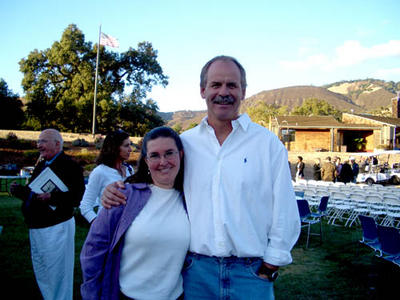
Another shot of the campus:
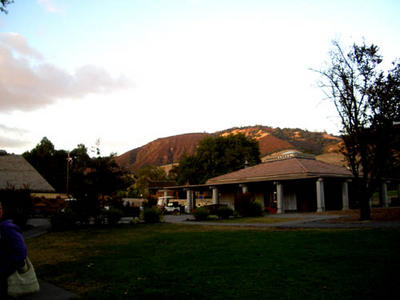
Friday, October 14, 2005
I just found out that an old friend of mine, and my sister's best friend, Ben Brandzel, is the one responsible for HurricaneHousing.org. He's currently in Gulfport, Mississippi talking with people and getting their stories. He's 25.The first quote is from the blog of my friend John. The second quote is from Hurricane Housing's website. When I was a junior in high school, I adopted the abovementioned Ben Brandzel as my little brother. I'd always wanted one, and I decided that freshman Ben would do just fine. He aquiesced and still calls me Di to this day (a pun on my last initial and and a common abbreviation of Didi, which means older sister in various Indian languages.)
He joined Moveon.org a couple of years ago, and became responsible for a lot of their web presence. Hurricanehousing was a website he proposed. He takes no credit. (Link.)
Thanks to the tens of thousands of generous individuals that offered housing, we helped nearly 30,000 hurricane victims start over. (Link.)
I've got to say, I have damn fine taste in siblings. Even in high school Ben was a tireless social activist. When he was in college, Ben started the Collegiate Click Drive for hunger. Later, when I met up with him in New York, he was touring America with Coldplay, getting out the message for Oxfam. Now he works for MoveOn.org, and you very well may get advocacy emails from him.
So I knew he had been in Gulfport and New Orleans, and I probably should have realized HurricaneHousing was his idea, but I just have to say, I'm terribly proud of him right now.
Thursday, October 13, 2005
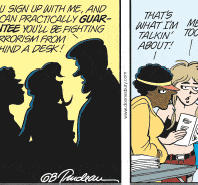 Trespassing at Your Own Public University?
Trespassing at Your Own Public University?When the basic AP article about the swearing in of the new Joint Chiefs of Staff has a lede that casually tosses off “recruitment shortfalls” in the same breath as Iraq and disasters, you can be assured it’s one of the military’s biggest concerns. Ace mil-blog Intel-Dump frequently highlights the number crunch being faced by the army, and Armchair Generalist analyzed the recent lowering of the educational bar. I sympathize with the recruiters greatly—we need a military, regardless of whatever goose-chase this or that administration might lead them on. It’s not really their fault that teenagers who don’t need a ticket out of town may question the extent to which the military is really about defending American freedom. That is, it’s not their fault until they start physically harassing a student-veteran for quietly protesting and then get him arrested on his own campus:
More than 100 George Mason University students and faculty members gathered on campus yesterday for a teach-in, six days after an undergraduate was arrested in a confrontation with military recruiters there.Tariq Khan, 27, said he was standing near the recruiters' table in the multipurpose Johnson Center at lunchtime last Thursday, holding fliers and wearing signs, including one on his chest that read "Recruiters Lie, Don't Be Deceived." One of the recruiters, plus another man who said he was a Marine, began yelling at him, he said, adding that the Marine ripped off his sign. Khan said that after a campus police officer asked for identification, which he didn't have with him, he was arrested, taken to the Fairfax County police department and charged with trespassing and disorderly conduct.Khan, a Pakistani American who grew up in Sterling and served four years in the U.S. Air Force, said the recruiters, and later the campus police, made disparaging comments to him about Middle Easterners. Daniel Walsch, a university spokesman, said that Khan "was considered to be distributing literature," which requires a permit, and that he was asked to leave the building.(Link)The ACLU is defending Khan, who has a court date of Nov 14. (Link). Last week he gave a speech at the rally:The ACLU of Virginia wryly notes that the arrest occurred "at a public university named after the person who may be most responsible for the Bill of Rights." Whether or not recruiters lie, George Mason U. is being patently untrue to its namesake's ideals if it fails to urge the Fairfax D.A. to drop charges against Mr. Khan. (Link.)
First of all I want to say that what happened to me last Thursday is not an isolated incident. . At at least three different colleges in the last week alone - the University of Wisconsin at Madison, Holyoke Community College in Massachusetts, and here at George Mason University - students engaged in non-violent counter-recruitment were met with police repression. . .And here at GMU I was harassed and assaulted by police and right-wing vigilante wannabe's simply for standing in the JC with an 8x11 sign taped to my chest that said "Recruiters lie. Don't be deceived." Then I was charged with trespassing and disorderly conduct. While the police and vigilantes were brutalizing me, other right-wing students were cheering them on and shouting "Kick his ass!" . .Officer Reynolds, the goon who arrested me told me that he had to handcuff me because of 9/11. He said, "I didn't know who you were, and what with 9/11 and all, there's no telling what you'd do." So because he didn't know me, he had to assume that I'm a terrorist. Another officer at the GMU police station shouted at me, "You people are the most violent people in the world! You're passive aggressive!" What does that mean? Who are "you people"?Besides the fundamental issue of preventing a student from engaging in free speech on a public campus, which I thought was settled over 40 years ago, there is the issue Khan brought up, a crystalized example of why we need first amendment rights to debate public policy and government actions in the first place—do recruiters lie?
It’s a question all Americans need to think about—if they do lie, they’re lying in our collective name. As I blogged then, during graduation season earlier this year, Doonesbury jokingly and somewhat mildly broached the subject of recruitment earlier this year, only to be followed by a news report indicating that truth is worse than fiction:
But two recruiters from Colorado have been suspended as the Army investigates accusations that they encouraged a teenager to lie and cheat so he could join up. Reporter Rick Sallinger of Denver TV station KCNC reports that 17-year-old high school journalist and honor student David McSwane is just the kind of guy the military would like. . . .For one thing, he told his recruiter, he was a dropout and didn't have a high school diploma.In May the army had to order a one-day halt in recruitment to review procedures, with 480 allegations of improper conduct to investigate. (Link) Swane recently followed up his adventure with a feature in Denver Westword. Besides this kind of basic dishonesty, which is essentially targeted at the military the recruiters serve, there is the issue of misrepresenting terms and natures of service to young recruits. AWOL resisters — or deserters — in Canada have repeatedly brought up the terms they say they thought they were getting:No problem, McSwane says the recruiter explained. He suggested that McSwane create a fake diploma from a nonexistent school.
Among the things Johnson was promised were a house to live in, a dental plan, medical coverage, more than $40,000 for college—and best of all, the recruiting officer told him, he wouldn’t even have to fight; if he liked, they would be happy to file the paperwork necessary to find him a nice desk job somewhere, no problem. Looking back at where he was in life and what the Army was promising him, Johnson still feels there was no way he could have refused. He was willing to do whatever they wanted, short of having to go to Iraq, and apparently, that wasn’t a problem. (Link) Cliff Cornell, from Arkansas, was stationed at Fort Stewart, Georgia. He joined the Army with the promise from a military recruiter that he would receive a $9,000 sign up bonus and job training. “Ninety per cent of what the recruiters tell you is a pack of lies,” said Cliff. Army recruitment techniques amount to entrapment, targeting young men from poor families, said Cornell. (Link.)These are serious allegations, and scream to be examined thouroghly, if skeptically. It’s of particular concern to immigrant communities, which are now prime recruiting grounds. (See previous posts.) A court martial started last week for a recruiter accused of facilitating illegal immigration to gain recruits. Perhaps veteran Tariq Khan instead deserves kudos for patriotically stirring up debate and discussion?
(crossposted at SepiaMutiny)
Wednesday, October 12, 2005
Slate has an interesting and very well-written article by David Dobbs on why it makes more sense to vaccinate children against the threat of flu*, rather than go the traditional route--vaccinating the sick and the old. The evidence is thick:
Because the human immune system weakens with age, only 28 percent of elderly people who get vaccinated develop immunity. The low rate of protection means that 84 percent of all elderly (the 72 percent whose vaccinations don't take, along with those who don't get vaccinated) remain prey to a flu virus that runs otherwise largely unchecked. . . The researchers confirmed that the flu spreads primarily via toddlers and school children, whose immature immune systems are easily infected and who have lousy hygiene. . . A whopping 90 percent are successfully immunized by a flu shot, compared to the 28 percent figure for the elderly and 60 percent for middle-aged adults. . following a devastating 1957 epidemic, Japan in 1963 established mandatory childhood flu immunization. By 1970 the country was vaccinating 50 percent to 85 percent of schoolchildren annually. Between that year and 1987, flu-related deaths fell 40 percent, saving 40,000 lives a year.I'm going to very amateurishly toss off another idea that a public health or virology expert can confirm or contradict: since this dread bird flu is, in fact, like the 1918 Spanish influenza, as researchers have shown, in some ways, might it not be like the Spanish influenza in other ways? In particular, the odd attack on the young. The strange thing about the Spanish influenza, in fact, the socially devastating thing, was that it killed young healthy people. So it seems like it makes even more sense to vaccinate children, protecting both them and their parents.
*Update: Dobbs helpfully pointed out that his article is only talking about vaccinating against the regular flu, not the bird flu as I originally stated, since no vaccine yet exists against the bird flu. So I suppose that makes my theory even less likely to work, considered with brimful's counsel in comments that the youth targeted by the Spanish influenza were probably 18-35-year-olds, not necessarily children. Still, age demographics and efficacy are always something to think about.
Tuesday, October 11, 2005
Last Thursday night, Scott and I went to the Recovery 2.0 inaugural meeting. We're not sure what form Recovery 2.0 efforts will take, but we know that at least a couple dozen people, from lowly bloggers like me to convener Jeff Jarvis to Yahoo! and Google representatives to Michael Powell, former chair of the FCC, to Brian Oberkirch, a survivor of Katrina, all wanted see how they could use the internet and technology to better serve disaster.
Scott and I were keen on getting two points out---that an ounce of prepardeness is worth a pound of relief and recovery, and that vulnerable populations need special help getting prepared and getting relief. Scott, of course, was representing for CARD. (I guess I was too, since I now volunteer for them.) But I'd like to think that I was also representing for desk-jockeys, pajama warriors, small-time volunteers and living-room charity poker players everywhere. People who would like to do more for their civil society in the odd hours of the day and night, or would like to know more surely that their volunteer work is fitting into a larger whole, or would like to get their small donation dollars to a needy and specific charity.
To that end I have just proposed a project on the Recovery 2.0 SocialText Wiki-like object. You can read the whole proposal here, but it basically sums up to this: I would like to have a database to volunteer for, a database I could, as a participant, enter information into and help fill. I want a database that I, as a user (in my capacities as a volunteer, donor, and blogger), could then search to find information and display it or print it or otherwise access it.
What kind of information? Geographically classified and searchable information about civil society organizations that are relevant to disaster relief. Shelters, clinics, schools, special-needs community centers, senior centers, TTD telephones, food banks, churches, etc.. Who they are, what they do, how they're funded, how efficient they are, what they need, where they are, how to get them money and stuff. I want to know that my effort to document and learn about my community is fitting into a larger effort, and I want to be able to quickly find, evaluate, and help civic groups at will. And I want to be able to create relevant maps fairly easily. (Note that if a database structure was created properly, and was sufficiently open source, there would be no reason for it to be restricted to being used for disaster preparedness and relief. )
Imagine, for instance, if such a database had been built and and the South Asian segment was being perpetually filled by volunteers all over South Asia. It would make the work of the South Asian Quake Help Blog so much easier. People could log on, grab a list of local NGOs with good reputations for giving food aid and not participating in local skirmishes. Money could be wired immediately. Imagine if it had existed for Katrina--evacuees could have taken advantage of the warning to line up shelters to stay at and clinics to get their prescriptions renewed by. We would immediately have been able to get a list of homeless shelters in the Houston area that we could immediately and directly send our money to, and maybe even contact them about showing up to volunteer.
Now I've never built such a thing. Really, I've never built anything much more computationally complicated than a counter of single-photons. I only recently started to get my wiki on. After many childhood and school years of volunteering, I spent most of my adult life volunteering for professional and academic-centered societies, and am only now really diving into local civil society. I haven't studied much geography. So this is really the ultimate bleg (blog beg.) If you can tell me where this database exists, fine. Please help me try to find it! Thank you! But in case we don't find it soon---please consider helping me make sure it happens. I think it would be cool and quite a bit of fun. I think we could even make it a lovable project.
Note--I know some of you are going to say, well, why not just use Google Maps? Answer: Maybe we will. I love Google Maps, and give them my fangirl praise whenever I see them. (The people, that is, not the maps.) But it's not necessarily visually flexible or GIS-like searchable enough to store and serve all this information.
Some blogs that gave me material to chew on while thinking about this: Ethan Zuckerman, in describing the aftermath of the KatrinaPeopleFinder, really blew me away with the possibilities of using parallelized labor to break down massive and tedious data entry tasks into bite size pieces. Hedgehog at Rhinocrisy reminded me of our need to trust those whom we are giving our money and time, and reasons for balancing donations to big centralized bureaucracies with direct-to-the-grassroots interaction. And Robin Sloan and Matt Thompson of Snarkmarket are always going on about maps.
My original Recovery 2.0 post. Technorati tag:recovery2
Monday, October 10, 2005
I'm a guest blogger on Sepia Mutiny this month--check it out. I will cross-post as appropriate.
Saturday, October 08, 2005
Earthquake in Kashmir
Kashmir and the surrounding area were hit by an earthquake today (yesterday, Indian time), causing devastation in three South Asian countries--India, Pakistan, and Afghanistan. The damage will be particularly hard to deal with because of the mountainous terrain and war-zone status of much of the region. The International Federation of the Red Cross and the Red Crescent will need our help, as will SEEDS India, an organization dedicated to disaster relief and disaster preparation. I would really love to get suggestions for other groups people think can help.
On Thursday night I went to the recovery2 meeting at Web 2.0 in San Francisco, on which I will write more shortly. One of the needs we talked about is the need to identify and work with community based organizations and NGOs and non-profits --documenting their needs and efficacy and donation-channels online--ahead of time so that concerned parties around the world can find them and quickly help them when disaster strikes. This is another sad example of why.
UPDATE: There is now a South Asian Quake Blog: http://quakehelp.blogspot.com. I'm helping with it and would really appreciate any tips and ideas you have. Kush Tandon has also pointed out that Oxfam is getting to work.
(posted using Anaconia's RocketPost.)
Thursday, October 06, 2005
Tuesday night Salman Rushdie read from his new novel, Shalimar the Clown, at the Berkeley City Club. He was hosted by Cody's Books, and introduced by owner Andy Ross, who said that at Cody's they felt they had a special relationship with Salman, but "perhaps all bookstores do." Salman corrected him--Cody's was special since, "not everyone got firebombed." I hadn't really known about that.
He read a bit of the story at its chronological start in Kashmir (the rich intonation of which stood out from his light, international accent like thick cream marbling coffee), first a bit of the inner mind of the tightrope-walking protagonist. Then, as he called them, he read the steamy bits, which were summarily protested by a wailing baby in the back. A classic Rushdie streak of magic realism came through in the second excerpt he read, set in San Quentin, though I was more charmed by the invocation of moonlight glinting on the dark waters of the San Pablo Bay which I gaze at daily. He is so deeply, thoroughly, adamantly secular--when I first saw him at SAJA last year, he admonished a questioner identifying him as a Muslim with the declaration that her little finger nail was more Muslim than he. But listening to him talk about the writing process--being dragged along by characters, waiting for stories coming to him, being loyal to characters--I thought he seemed to believe much more in a muse than many spiritualists I know.
I asked him if he uses any kind of methodical process to piece together dialogue in the mouths of characters of all races and classes and geographies, and he said there was no method, only madness--a reliance on his ear and instinct that he did not think could be taught. He said he thought craft can be taught, but one must have ear and eye for oneself. He related that when he was reading history at Cambridge, his teacher told him he should not write history until he could hear the subjects talking in his head, sing their slang. If I could have followed up, I would have asked if he had any trouble going around and "feeding his ear," so to speak, with so much notoriety. When one questioner tried to be sly and pointed out that there's some similarity between the name Shalimar and the name Salmaan, Rushdie drily replied, "They both start with S," and then complained about the plethora of autobiographical analyses his writing gets because "you all" know far too much about him. Afterwards, a friend I with wondered if I might be overestimating the difficulty Rushdie would have in wandering the states and drinking in dialect. I had to grant that the crowd at the City Club seemed a bit older.
Oddly, Cody's did not supply vegetarian appetizers, and by the time the reading was over, my friend and I were starved. I could see that the reading was substantially smaller than Gaiman's last week, but it was still huge, and I didn't want to repeat the mistake of waiting around when I could go and return in time. (A Cody's staffer confirmed that Gaiman had indeed been signing until 1:30 in the morning last weekend.) My friend and I ran and grabbed Thai food and ran back and were horrified to see no line, but then there was Rushdie, signing extra copies for Cody's, and just at the end I got mine signed. He thanked me absently, capped his pen, and we all walked out into the quiet night, substantially calmer than last week. So many stories to see and voices to hear, so little time.
Sunday, October 02, 2005
Today is the Birthday of Mohandas Karamchand Gandhi, commonly known as Mahatma Gandhi-- Gandhi, the great soul. His hard work and dedication to the ideals of nonviolence and freedom, as well as to the well-being of his motherland, have enshrined him in history as a symbol of idealism and the ability of the human spirit to triumph over great obstacles. He was, really, just a human being--but how many of us fellow human beings can even fathom such sacrifice, such focus, such determination to maintain a kind and hopeful heart? Many of life's failures are failures of imagination. Historians may debate the exact proportion of Gandhi's contribution to ushering in the world's biggest secular democracy, and our measure of his exact political works may ebb and flow. What will not ebb and flow is the fact that no one need imagine the idea of Gandhi out of whole cloth. It already exists for all of us to tap into, carefully and respectfully, I hope.
Saturday, October 01, 2005
So the reason why I had a good reason not to observe National Geek Day (see below) by going to go see Mirrormask or Serenity open is because I was actually basking in the physical presence of National Geek himself--i.e. Neil Gaiman. Okay, so since he's really a Brit, we can't completely claim him, but that's even better--he's iNternational Geek.
He gave a lovely talk at Berkeley's lovely First Congregational Church (dressed in his trademark black denim and leather, he gripped the ornate gilded lectern on the stage and greeted us with a somber, "Dearly beloved"), and read from the new Anansi boys (Debuting at #1 on the New York Times Best Seller List!!) Actually, National Geek Day was coined, apparently, not by him, but by Sky McCloud, daughter of Scott McCloud. (See here for an adorably creepy photo of Sky and Neil.) He also answered a question about a potential future collaboration with Terry Pratchett along the lines of Good Omens with an incredibly qualified, conditional, multi-claused perhaps that I and 700-odd other shrieking fans interpreted as a very strong commitment.
And then he signed, and he signed, and he signed, and he signed, and actually, despite the fact that I got my book signed around 11:30 and it's now about two hours later, I wouldn't be surprised if he's still signing books there. The man loves his fans, and we love him for it. Cody's gave us clothes-pins with numbers on them so we would only have to stand in line in batches of 100 or so. Lars Erik and Scott (both dojo-mates) were there, so while we waited they did quite a bit of practice and tumbling, attracting a crowd of adolescents and teenagers who very well might show up to Aikido next week. I practiced some punches and even some Bharat Natyam on the grass. We did rolls and tumbles. Conversations included the elusive excellence of the three level pun, blog communities, and the purported difficulty of a lot of good authors. It was a generally convival evening out beneath the stars. Gaiman signed my book with some good advice for a writer, and I was pretty happy with the evening. Really we could have gone, had dinner, watched Mirrormask and still come back in good time to get our books signed. Ah well, there's tomorrow.
We here at Datta industries also deeply appreciate our readers, and I'd like to take a moment to thank you for coming along for the ride. It's just a bit over two years ago that I started this blog, but it's appropriate that I wait till today to note it, b/c my first blogpost was about the last time I saw Neil Gaiman read and sign. His blog was, and is, one of my favorites, and it was the first blog that really got me hooked on the idea of blogging myself. Would that my life were as deliciously interesting as his! I certainly cover very different ground. But I've always appreciated his conversational tone and the sense that he does like to interact with his readers as he can. I really apppreciated it when he posted a link to my list of of how to help Tsunami victims. (I was also pretty happy that he liked the corpse cake.) You'd think his blog would be all about ghosts and music and obscure poetry, but the warm sense of community he inspires "merely" by doing good work and exuding good will has coalesced a famously generous fan base. Amazingly enough, little ole me has gotten a taste of this sense of community from my dear band of witty, informative, kind readers. No one knows where this blogosphere thing is going, but thanks for coming on the ride!